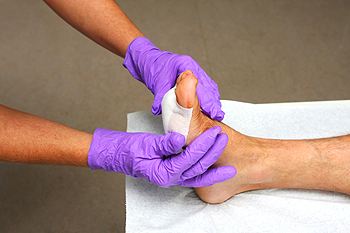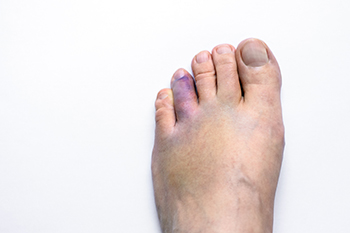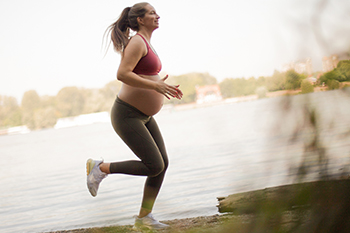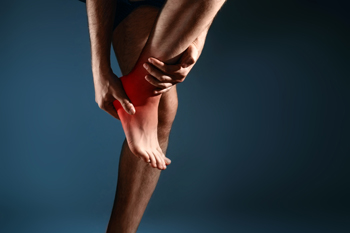Connect With Us
Blog
Items filtered by date: October 2023
Children’s Toe Wounds

An open wound on the toe involves a disruption in the skin, ranging from a superficial cut to a more serious injury that impacts the deeper structures like tendons, muscles, ligaments, nerves, blood vessels, and bone. For minor wounds, basic first aid is usually sufficient. However, if the toe wound is deep, has a wide opening, or exhibits persistent bleeding, immediate attention by a podiatrist is necessary. In such cases, the podiatrist may use stitches or medical tape to close the wound. It is particularly important to be vigilant about wounds on the toes, as our feet are often exposed to dirt and bacteria, making them more susceptible to infection. Once a child has been treated for a toe wound, it is imperative to adhere strictly to the podiatrist's guidelines to prevent infection and minimize the potential for scarring. If your child has sustained a toe wound and it is more than a minor scrape, it is strongly suggested that you make an appointment with a podiatrist for treatment.
Wound care is an important part in dealing with diabetes. If you have diabetes and a foot wound or would like more information about wound care for diabetics, consult with one of our podiatrists from American Surgeons Group. Our practitioners will assess your condition and provide you with quality foot and ankle treatment.
What Is Wound Care?
Wound care is the practice of taking proper care of a wound. This can range from the smallest to the largest of wounds. While everyone can benefit from proper wound care, it is much more important for diabetics. Diabetics often suffer from poor blood circulation which causes wounds to heal much slower than they would in a non-diabetic.
What Is the Importance of Wound Care?
While it may not seem apparent with small ulcers on the foot, for diabetics, any size ulcer can become infected. Diabetics often also suffer from neuropathy, or nerve loss. This means they might not even feel when they have an ulcer on their foot. If the wound becomes severely infected, amputation may be necessary. Therefore, it is of the upmost importance to properly care for any and all foot wounds.
How to Care for Wounds
The best way to care for foot wounds is to prevent them. For diabetics, this means daily inspections of the feet for any signs of abnormalities or ulcers. It is also recommended to see a podiatrist several times a year for a foot inspection. If you do have an ulcer, run the wound under water to clear dirt from the wound; then apply antibiotic ointment to the wound and cover with a bandage. Bandages should be changed daily and keeping pressure off the wound is smart. It is advised to see a podiatrist, who can keep an eye on it.
If you have any questions, please feel free to contact our offices located in Homewood, South Chicago Heights, and Mokena, IL . We offer the newest diagnostic and treatment technologies for all your foot care needs.
When to See a Doctor for a Broken Toe

Breaking a toe can result in pain, swelling, and bruising due to internal bleeding. The area may look misshapen, especially if the bone ends are displaced or if the fracture extends into the toe joint. The big toe, which bears more weight during walking, is especially painful when fractured. Distinguishing a broken toe from a sprain or strain can be challenging, but a misshaped toe often indicates a fracture. An X-ray is typically the definitive method for diagnosis. Broken toes are common and often do not require specific treatment. However, it is essential to see a podiatrist if pain intensifies, swelling persists, or if the toe appears misaligned. For more severe toe fractures, treatment can involve a cast, especially for the big toe, which plays an essential role in balance. Surgery may be necessary in some cases, which can involve using metal wires, plates, or external fixation methods. Possible complications post-fracture include failed bone healing, infections, stiffness, persistent pain, and post-traumatic arthritis. If you have a broken toe that is not healing on its own, it is strongly suggested that you make an appointment with a podiatrist for necessary treatment.
Broken toes may cause a lot of pain and should be treated as soon as possible. If you have any concerns about your feet, contact one of our podiatrists from American Surgeons Group. Our practitioners will treat your foot and ankle needs.
What Is a Broken Toe?
A broken toe occurs when one or more of the toe bones of the foot are broken after an injury. Injuries such as stubbing your toe or dropping a heavy object on it may cause a toe fracture.
Symptoms of a Broken Toe
- Swelling
- Pain (with/without wearing shoes)
- Stiffness
- Nail Injury
Although the injured toe should be monitored daily, it is especially important to have a podiatrist look at your toe if you have severe symptoms. Some of these symptoms include worsening or new pain that is not relieved with medication, sores, redness, or open wounds near the toe.
If you have any questions, please feel free to contact our offices located in Homewood, South Chicago Heights, and Mokena, IL . We offer the newest diagnostic and treatment technologies for all your foot care needs.
See Your Podiatrist Regularly If You Work On Your Feet
Guide to Running During Pregnancy

In the past, it was often believed that pregnancy meant complete bed rest, but times have changed. Medical advice now emphasizes the importance of staying active during pregnancy. This shift has led many expectant mothers to wonder if it is safe to continue running while pregnant. The short answer is yes, you can continue running during pregnancy, but it comes with some considerations. If you were an avid runner, you may be able to continue with certain modifications. However, as your due date approaches, transitioning to lower-impact activities like walking or swimming is thought to be a wiser choice. Running offers numerous benefits during pregnancy, such as reducing the risk of pre-eclampsia and gestational diabetes, maintaining a healthy body weight, and improving overall well-being. However, if you experience dizziness, vaginal bleeding, breathing difficulties, or foot and ankle pain, stop running immediately and seek medical attention. While running during pregnancy can be safe and beneficial, it requires careful consideration and consultation with your medical team. If you experience foot pain after running during pregnancy, it is suggested that you make an appointment with a podiatrist.
Pregnant women with swollen feet can be treated with a variety of different methods that are readily available. For more information about other cures for swollen feet during pregnancy, consult with one of our podiatrists from American Surgeons Group. Our practitioners will attend to all of your foot and ankle needs.
What Foot Problems Can Arise During Pregnancy?
One problem that can occur is overpronation, which occurs when the arch of the foot flattens and tends to roll inward. This can cause pain and discomfort in your heels while you’re walking or even just standing up, trying to support your baby.
Another problem is edema, or swelling in the extremities. This often affects the feet during pregnancy but tends to occur in the later stages.
How Can I Keep My Feet Healthy During Pregnancy?
- Wearing orthotics can provide extra support for the feet and help distribute weight evenly
- Minimize the amount of time spent walking barefoot
- Wear shoes with good arch support
- Wear shoes that allow for good circulation to the feet
- Elevate feet if you experience swelling
- Massage your feet
- Get regular, light exercise, such as walking, to promote blood circulation to the feet
If you have any questions please feel free to contact our offices located in Homewood, South Chicago Heights, and Mokena, IL . We offer the newest diagnostic and treatment technologies for all your foot and ankle needs.
Finding the Perfect Hiking Boots

Selecting the right hiking boots is a big decision for any outdoor enthusiast. These boots can make or break your hiking experience, impacting your comfort, support, and overall safety on the trail. This can begin by considering the terrain you plan to hike. Different types of hikes, whether on rocky trails, muddy paths, or steep ascents, require specific features in your boots. Choose a boot with appropriate sole traction, ankle support, and water resistance that matches your hiking environment. This can be followed by focusing on fit. Ensuring your hiking boots fit snugly, but leaving enough room for your toes to wiggle comfortably. Try on boots in the late afternoon when your feet are slightly swollen to mimic conditions on the trail. It is beneficial to break in your boots before embarking on a long hike. Wear them around your home or on shorter walks to allow them to mold to your feet and prevent painful blisters. Lastly, consider your personal preferences. Some hikers prefer lightweight and flexible boots, while others prioritize durability and sturdiness. If you would like more information about what type of hiking boots to buy, it is suggested that you confer with a podiatrist who can provide you with the knowledge you are seeking.
Finding a properly-fitting shoe is important in reducing injuries and preventing foot problems. For more information about treatment, contact one of our podiatrists from American Surgeons Group. Our practitioners will treat your foot and ankle needs.
Proper Shoe Fitting
A common concern when it comes to foot health, having properly fitted shoes can help prevent injuries to the foot. Out feet affect our posture and gait, which in turn affects the biomechanics and overall bodily structure. With 33 joints, 26 bones, and over 100 ligaments, the potential for serious injury is much greater than one realizes. Although the feet cease growth in adulthood, they still change shape as they mature. Here are some factors to consider when it comes to investing in proper fitting shoes:
- Be sure the shoes fit correctly right away
- Ensure the ball of your foot fits comfortably in the widest portion of the shoes
- Even though they may look fashionable, improper fitting shoes can either create adverse conditions or exacerbate existing ones you may already have
- Walk along a carpeted surface to ensure the shoes comfortably fit during normal activity
Keeping in mind how shoes fit the biomechanics of your body, properly-fitting shoes are vitally important. Fortunately, it is not difficult to acquire footwear that fits correctly. Be sure to wear shoes that support the overall structure of your body. Do your feet a favor and invest in several pairs of well-fitted shoes today.
If you have any questions please feel free to contact our offices located in Homewood, South Chicago Heights, and Mokena, IL . We offer the newest diagnostic and treatment technologies for all your foot and ankle needs.
Discovering the Root Causes of Heel Pain

Heel pain is a common ailment that can be both uncomfortable and debilitating. To effectively address heel pain, it is important to understand its underlying causes, as they can vary widely. One prevalent culprit is plantar fasciitis, a condition marked by inflammation of the plantar fascia, a thick band of tissue that runs along the bottom of the foot. This condition often results from overuse, poor footwear choices, or excessive strain on the foot's arch. Achilles tendinitis is another leading cause of heel pain, stemming from inflammation of the Achilles tendon, located at the back of the heel. This condition can be triggered by intense physical activity, tight calf muscles, or inadequate warm-up routines. Heel spurs, bony growths on the heel bone, can also lead to discomfort, though they may not always be painful. Stress fractures, arthritis, nerve irritation, and obesity are additional factors that can contribute to heel pain. Wearing unsupportive shoes and making abrupt increases in physical activity levels can exacerbate these conditions. To effectively manage heel pain, it is essential to identify the specific cause through proper diagnosis. Treatment options may include rest, stretching exercises, orthotic devices, or, in some cases, medical interventions, depending on the severity and root cause of the pain. If you are experiencing heel pain, it is suggested that you visit a podiatrist who can diagnose the cause and offer a treatment plan that is right for you.
Many people suffer from bouts of heel pain. For more information, contact one of our podiatrists of American Surgeons Group. Our practitioners can provide the care you need to keep you pain-free and on your feet.
Causes of Heel Pain
Heel pain is often associated with plantar fasciitis. The plantar fascia is a band of tissues that extends along the bottom of the foot. A rip or tear in this ligament can cause inflammation of the tissue.
Achilles tendonitis is another cause of heel pain. Inflammation of the Achilles tendon will cause pain from fractures and muscle tearing. Lack of flexibility is also another symptom.
Heel spurs are another cause of pain. When the tissues of the plantar fascia undergo a great deal of stress, it can lead to ligament separation from the heel bone, causing heel spurs.
Why Might Heel Pain Occur?
- Wearing ill-fitting shoes
- Wearing non-supportive shoes
- Weight change
- Excessive running
Treatments
Heel pain should be treated as soon as possible for immediate results. Keeping your feet in a stress-free environment will help. If you suffer from Achilles tendonitis or plantar fasciitis, applying ice will reduce the swelling. Stretching before an exercise like running will help the muscles. Using all these tips will help make heel pain a condition of the past.
If you have any questions please contact our offices located in Homewood, South Chicago Heights, and Mokena, IL . We offer the newest diagnostic and treatment technologies for all your foot and ankle needs.

